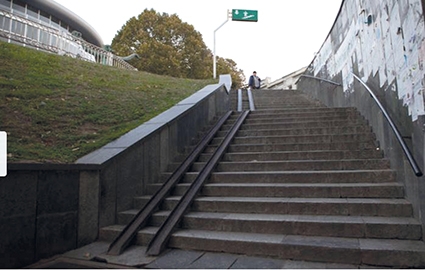Accessible Infrastructure to be Installed in Tbilisi
Two announcements were made this week on improving the accessibility of Tbilisi for people with certain disabilities.
On Wednesday, the Parliament of Georgia adopted a bill increasing the fine for illegally parking in a spot reserved for people with disabilities from 10 GEL ($4) to 50 GEL ($18). The bill passed easily, with 91 members voting in favor of the increase, out of the 150-member Parliament – unsurprisingly, as the bill was introduced by ruling party Georgian Dream. Georgian Dream Parliamentarian Rati Ionatamishvili, who himself uses a wheelchair, co-authored the bill, along with Natia Mikeladze, the Secretary of the Government of Georgia to the Parliament. The new, more severe penalty applies only in Tbilisi and Batumi. Ionatamishvili and his coalition argued that the 10 GEL fine was not a sufficient deterrent to prevent people from illegally parking in spots marked for people with disabilities, thus decreasing their accessibility in urban areas.
Another measure addressing accessibility was announced Wednesday by Tbilisi City Hall. With support from the Turkish Cooperation and Coordination Agency, City Hall will install elevators at three underground walkways in the city. The selected walkways are some of the most frequently used, by both locals and tourists, and are all located in the city center: Melikishvili Street, near the Tbilisi Concert Hall, crossing Rustaveli Avenue, and on Liberty (Freedom) Square. The goal of installing the elevators is to improve accessibility for people with physical disabilities, and to increase their mobility. The budget for the project is $100,000.
Despite these and other efforts, Georgia remains largely inaccessible for people who use wheelchairs. In a 2015 article, Chaikhana.org explained that in the South Caucasus, “most places are not accessible. And even though some organizations have attempted to adapt their environment to make them more accessible, they did not adhere to well-known accessibility standards, causing those environments to remain inaccessible,” including, for example, wheelchair ramps on underpasses that are too narrow, too steep, and made with dangerous materials such as steel and marble. “It is unknown how much the government in each South Caucasus country spends or plans to spend to adapt locales and services for people with disabilities,” reports Chaikhana.
The Georgian government has taken certain steps towards improving accessibility in the country. Currently, Tbilisi has 816 buses, of which 233 are new and wheelchair-accessible. The first of the accessible buses were introduced in September 2016, and 220 more buses are on order, to be delivered by the end of the year, replacing the city’s entire fleet of outdated, unsafe, and inaccessible buses. By January of this year, all public services halls across the country had installed accessible infrastructure with financial support from the UNDP and the Government of Sweden – the first government service agency to meet that milestone. The Government of Batumi has announced plans to make the city’s beach more accessible for wheelchair users as well, by purchasing water-safe, floating beach wheelchairs, and by adapting public changing rooms and restrooms to be wheelchair accessible.
In January, the government passed a bill forgiving the administrative fines levied on members of certain socially vulnerable groups, including people with disabilities. In December, the Ministry of Internally Displaced Persons from the Occupied Territories, Labor, Health, and Social Affairs opened a new Specialized Family-Type Service for Children with Severe Disabilities in Tbilisi, with the support of USAID and UNICEF, and the M2 Real Estate Company, which fully covered the facility’s construction costs. A two-year campaign called “See Every Color,” carried out by UNICEF and supported by USAID and the European Union from 2016-2018, reported that “Georgia has managed to reduce negative perceptions and attitudes towards children and young people with disabilities by more than 13%,” said Ghassan Khalil, UNICEF Representative in Georgia. “Children and young people with disabilities have more opportunities now to develop and enjoy their rights. As a result of the campaign, we have created a core group of change-makers who will further work to build more inclusive societies. We will continue to support the government to enable them to lead the process of social change and will work with various professional groups to further overcome stigma against disability,” Khalil added in a January 2018 report.
By Samantha Guthrie
Image source: Chaikhana.org











